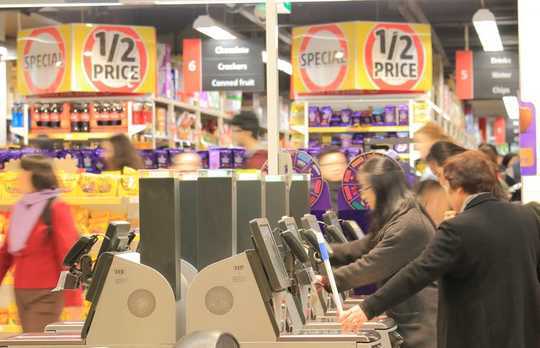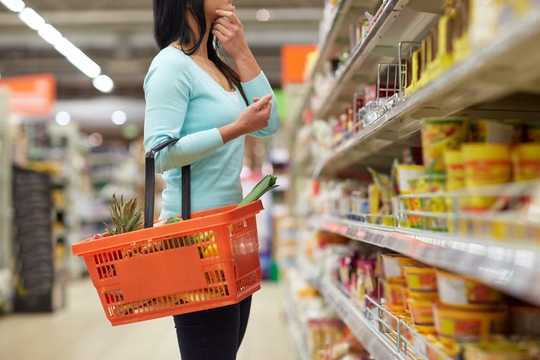
Supermarkets may discount junk foods to capitalise on the ‘impulse buy’. From shutterstock.com
Half-price chips, “two for one” chocolates, “buy one get one free” soft drinks: Australian supermarkets make it very easy for us to fill our trolleys with junk food.
Add in the bonus of an Ooshie or a Little Shop collectable and you’re likely going home with a pile of products that will fill out both your pantry and your waistline.
We looked at supermarket specials over a year to see how healthy they were. The results of our research, published today, show junk foods are discounted, on average, twice as often as healthy foods.
Australians buy about two-thirds of their food and drink at the supermarket, and 40% of their foods on special. We know environments dominated by heavily promoted junk foods are a key driver of unhealthy diets.
Get The Latest By Email
Where unhealthy diets are one of the leading contributors to poor health in Australia, the way supermarkets apply discounts needs to change. We all love a bargain, but we may be paying the real price with our health.
Junks foods attract more specials, and bigger discounts
In our research, junk foods included chocolate, chips, confectionery, ice cream and high-sugar breakfast cereals. We found these sorts of products were on special twice as often as healthy foods – 29% versus 15% of the time.
We also looked at how discounts varied according to the healthiness of the products. We assessed the “healthiness” of foods using the Health Star Rating system – an Australian government-endorsed scheme that gives each product a score out of five.
We found the more stars a food product had, the less often it was on special, and the smaller the discount when it was. Discounts applied to junk foods were, on average, almost twice as large as discounts on healthier options (26% off versus 15% off).
A similar recent study of drink specials in supermarkets over a year found almost half of all drink specials were for sugar-sweetened beverages (soft drinks, sports and energy drinks, and cordials). Within drink categories, twice as many sugar-sweetened beverages were on special compared to specials for milk and water (34% versus 15% of the time).
How do supermarkets decide what to discount?
The way supermarkets choose what products are on special each week is complex.
Food manufacturers pay large premiums to have their products featured in supermarket catalogues, at end-of-aisle displays or near the checkout. The arrangements between food manufacturers and supermarkets are often governed by contracts that specify the way products are to be promoted.

Consumers will often make purchasing decisions based on what’s on special. From shutterstock.com
Food manufacturers and supermarkets know unhealthy food is often bought on impulse, making price discounts a great way to entice customers to make those impulse choices.
Despite their claims to be healthy places to shop, supermarkets are major culprits in pushing junk food upon us.
Does it have to be this way?
If Australia is serious about addressing its obesity crisis, the way junk food is promoted in our supermarkets needs serious review. There’s a real opportunity for both supermarkets and food manufacturers to take the lead in helping to encourage healthier eating.
Big supermarket chains stock more than 30,000 products. Most large food manufacturers have a wide variety of products, ranging from more healthy to less healthy. Supermarkets and food manufacturers could work together to put healthier options on special more often.
Government regulation may play a role, too. Governments around the world are starting to recognise the role of price discounts in driving unhealthy diets. There are current proposals in the UK and Scotland to use government regulations to restrict price discounts for unhealthy products.
There are several ways governments in Australia could step in to limit the impact of unhealthy discounting, including:
- restricting the proportion of unhealthy food allowed to be discounted
- restricting multi-buy specials (such as “buy one get one free”) on unhealthy products
- reducing the size of discounts on unhealthy food
- restricting the advertising of price discounts (for example, through signage).
Supermarkets of the future
Imagine what it would be like to shop at a supermarket where healthier food was on special more often, and with bigger discounts. Where customers were enticed by discounted fruit and vegetables instead of half price chips, chocolate and soft drinks.
Australian supermarkets have already taken some positive steps to make their stores healthier, including an increased focus on fresh food. Extending this to improving the healthiness of their discounts could have a real benefit on the health of generations to come.
About The Authors
Adrian Cameron, Associate professor, and Associate Director of the Global Obesity Centre, Deakin University; Christina Zorbas, PhD Candidate, Deakin University; Devorah Riesenberg, Research fellow, Deakin University; Gary Sacks, Associate Professor, Deakin University, and Kathryn Backholer, Senior research fellow, Deakin University
This article is republished from The Conversation under a Creative Commons license. Read the original article.
books_food







